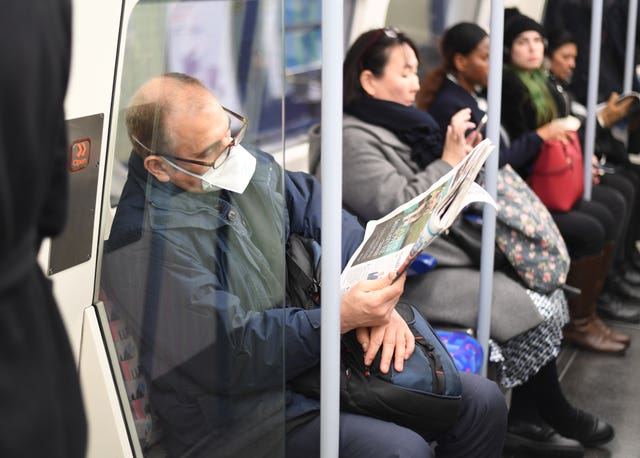
Experts are to review evidence on whether wearing masks in public could protect from Covid-19, an infectious disease specialist has said.
The World Health Organisation (WHO) has said that people only need to wear masks if they are caring for someone with Covid-19, or if they themselves are coughing or sneezing.
But experts are planning to examine information from Hong Kong which suggests masks may have a protective benefit for the public, one expert has said.
When to use mask 😷• If you are healthy, you only need to wear a mask if you are taking care of a person with suspected #coronavirus infection.• Wear a mask if you are coughing or sneezing
More https://t.co/4odGgqxAKP#COVID19 pic.twitter.com/1aM8MyaSmF
— World Health Organization (WHO) (@WHO) March 1, 2020
But infectious disease specialist Professor David Heymann cautioned that recommendations on masks are difficult due to problems with them being worn incorrectly or not properly disposed of.
Meanwhile, he urged caution for people who opt to buy home testing kits which detect whether or not they have had Covid-19.
On masks, Prof Heymann told a Chatham House briefing: “There is right now a debate about the usefulness of masks because Hong Kong has provided some evidence that masks may be useful in protecting individuals from infection.
“It’s not clear yet whether or not that’s true.
“WHO, the group that I work with, is debating that with a group of experts around the world tomorrow, to understand whether there is evidence which would call for a change in what WHO is recommending now for masks – which is that they really don’t have a major role in protecting people from infection except in healthcare workers where they also wear eye protection and they also have a role from protecting others from coughs or sneezing.”

He added: “But as the evidence becomes available, it seems there will be a debate trying to decide whether masks play a role at some point in the outbreak.
“And believe me, if they do, there is a private sector healthy enough to begin producing those masks in quantities necessary.”
Meanwhile, he was asked whether or not people should buy a £39 antibody test advertised on Facebook.
“That’s up to the person, if you are buying for your own interest in knowing if you have an antibody then why not buy it?” he said.
“But the problem is that you don’t know if this is a highly specific or sensitive test unless you have read the package insert or asked the company what is the sensitivity or specificity.
“It is a free world, anybody can buy what they want to buy and use it, but you need to think twice as to whether it is a wise investment for the purposes that you want the test for.
“If you want to just see if you have coronavirus antibody then you could check it.
“If you want to see if you have Covid antibody then you might want to do a little bit more detailed investigation as to what that test is telling you.”
But he added that it is not yet known whether having immunity to Covid-19 is long-lasting.
“We don’t know yet in the new coronavirus that causes Covid-19 whether or not that coronavirus does cause long-lasting immunity and therefore we can’t make too many assumptions,” he added.
“It would be nice to say ‘if I have antibody I feel a bit safer going back out into the public’ but with the caveat that I don’t understand how long that immunity would last.
“Certainly, a reinsertion strategy would say yes, people who have antibody to this coronavirus could at least begin to work possibly, depending on what a country risk tolerance is, they could begin to working properly back in society and then we will know.”
Meanwhile, he said that the UK has “hopefully” avoided a major surge of demand on hospitals.
“Because Italy had been focusing on outbreak containment and wasn’t watching what was happening in its hospitals and all of a sudden hospitals became overwhelmed with patients and they weren’t able to accommodate them all,” he said.
“They didn’t have sufficient ventilators and they had a very high level of mortality occurring, so countries then adapted their strategies to a strategy that was more aimed at making sure there was not a surge of patients in the hospitals but rather there could be a more balanced arrival of patients in hospital.
“To do that, many countries developed a delay strategy and among that was the UK which has delayed a major surge, hopefully.”


Comments: Our rules
We want our comments to be a lively and valuable part of our community - a place where readers can debate and engage with the most important local issues. The ability to comment on our stories is a privilege, not a right, however, and that privilege may be withdrawn if it is abused or misused.
Please report any comments that break our rules.
Read the rules here